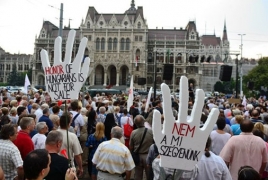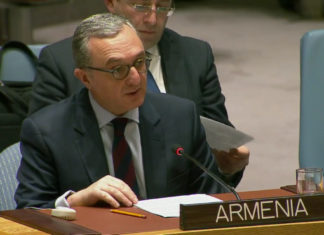 YEREVAN and BUDAPEST (Combined Sources) — The extradition of an Azerbaijani soldier jailed in Hungary for the 2004 murder of an Armenian soldier, Lt. Gurgen Markarian, to Azerbaijan and his subsequent — and immediate — presidential pardon and hero’s welcome touched off a firestorm in Armenia, the Armenian Diaspora as well as within Hungary itself.
YEREVAN and BUDAPEST (Combined Sources) — The extradition of an Azerbaijani soldier jailed in Hungary for the 2004 murder of an Armenian soldier, Lt. Gurgen Markarian, to Azerbaijan and his subsequent — and immediate — presidential pardon and hero’s welcome touched off a firestorm in Armenia, the Armenian Diaspora as well as within Hungary itself.
Armenia said it was suspending diplomatic relations with Hungary on Friday.
“Hungarian authorities should understand that they have made a grave mistake,” President Serge Sargisian told his Security Council. “They de-facto made a deal with the Azeri authorities.”
The row erupted after Azerbaijan President Ilham Aliyev pardoned Ramil Safarov, who had been sentenced to life in prison for the killing of Markarian during a NATO Partnership for Peace English-language training in Budapest.
Hungary agreed to return Safarov to Azerbaijan after it had received assurances he would serve out his sentence in a local prison but he received a presidential pardon and was promoted from lieutenant to major.
Hungary has been developing economic ties with energy-rich Azerbaijan and gave backing to the Nabucco pipeline project, seen as the main route for Azeri gas exports to Europe. Hungarian media reported that Azerbaijan could lend Hungary 2-to-3 billion euros ($2.5-3.8 billion).









